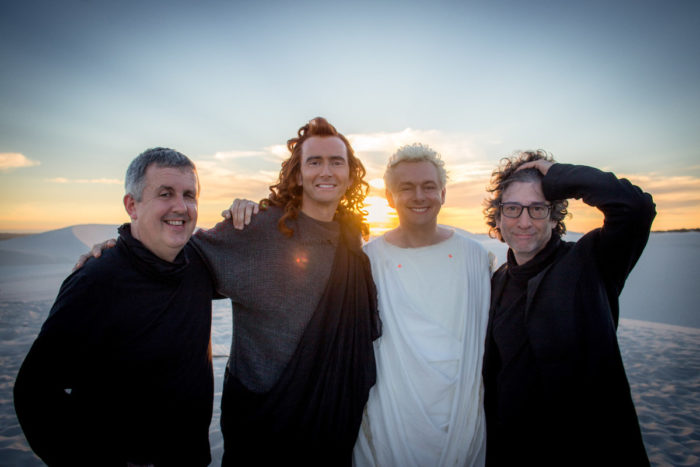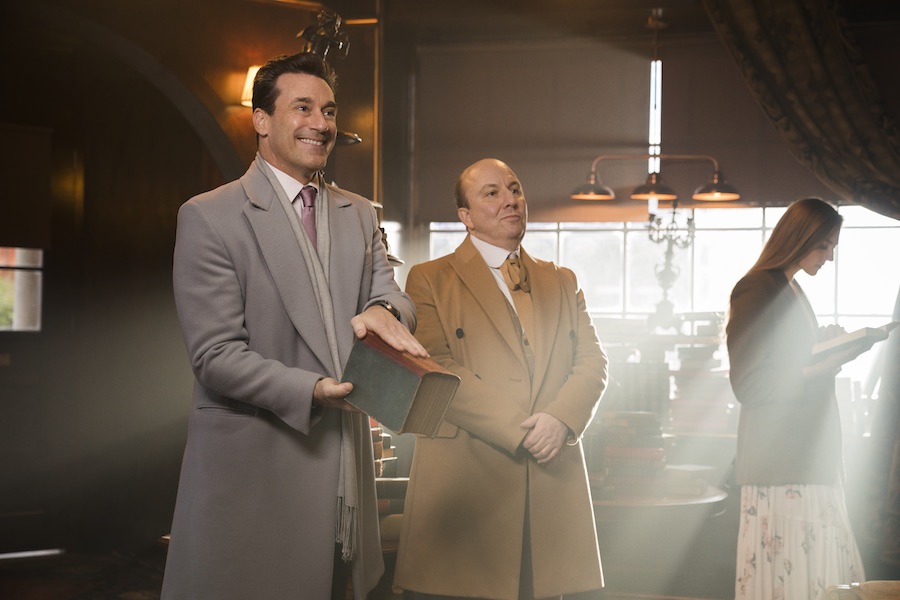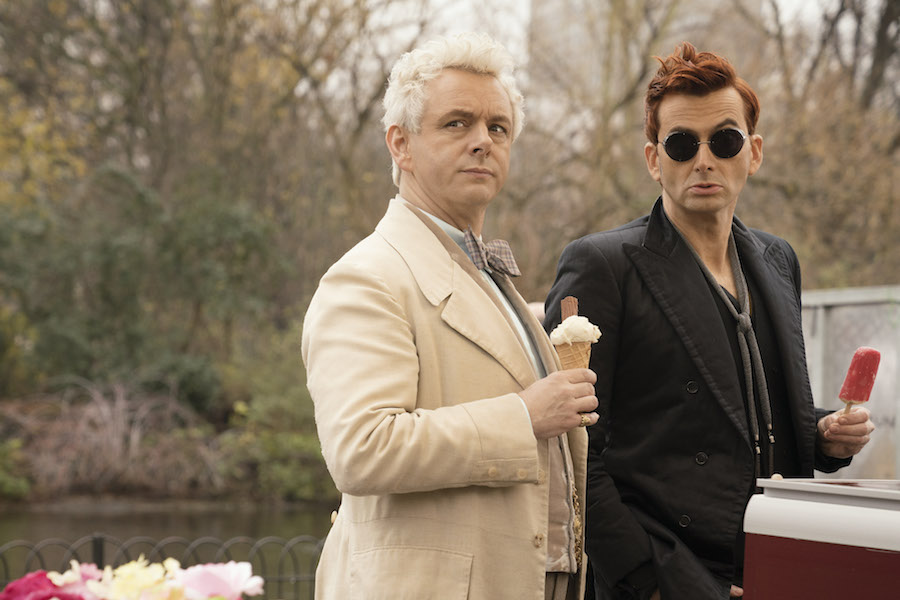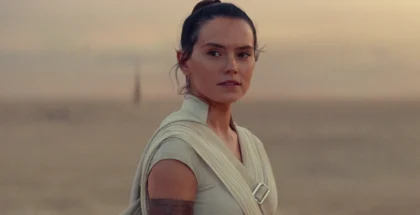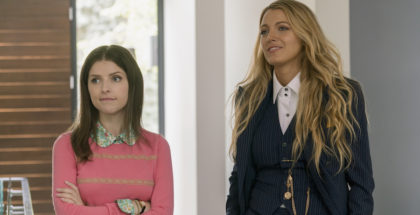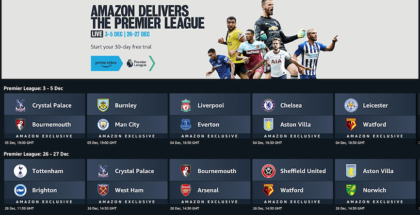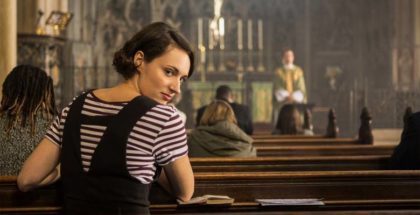Interview: Neil Gaiman and Douglas Mackinnon talk Good Omens and Terry Pratchett
David Farnor | On 15, Jan 2020
Good Omens airs on BBC Two at 9pm on Wednesdays. This interview was originally published in May 2019 to accompany its premiere on Amazon Prime Video.
Based on the 1990 book of the same name by Terry Pratchett and Neil Gaiman, Amazon and BBC Two’s six-part adaptation of Good Omens tells the story of the end of the world – and the attempts of one fussy angel (Aziraphale – Michael Sheen) and one loose-living demon (Crowley – David Tennant) to prevent it, saving the Earth they’ve become rather fond of. The only hitch? They’ve lost the Antichrist, an 11-year-old boy unaware he’s meant to bring about Armageddon.
Directed by Douglas Mackinnon (Doctor Who) and written by Gaiman, who also acts as showrunner, the project came about when Terry sent Gaiman a note telling him that he had to make it, so he could watch it before the lights went out. Just over four years since the beloved author tragically passed away, the show finally arrives on our screens, and it’s a wonderful tribute to both Sir Terry and the book. (You can read our review here.)
Expanded with additional bits that are partly based on bits Neil and Terry had written but never used, the result is a labour of love that has attracted all manner of impressive names, from Mark Gatiss and Reece Shearsmith to David Morrissey and Derek Jacobi. (Jon Hamm was emailed by Neil to ask if he would play the Angel Gabriel, and the Mad Men star just wrote back the word “yes”.)
We sat down with Neil and Douglas to talk adapting the novel for the screen, Neil’s recent overall deal with Amazon Studios, and doing justice to an old friend.
After you got the note from Terry, how did you go about adapting something so personal for TV?
NG: He was always there because he was in the book, but there were two circumstances in which I really wanted Terry there. One of them is when I got stuck. When I would have to do an imaginary angel-on-my-shoulder Terry, who would be sitting there going ‘Ah, grasshopper, the solution to the problem is contained in how you ask the question’. Which was the kind of thing he’d say to me and I’d go ‘Terry! Don’t just say that to me! Give me an answer!’ But also, when I did something really clever, and part of the joy of writing Good Omens together was we had a very small audience: my audience was Terry and his audience was me. So when either of us would do anything clever, the first thing we’d do is ring the other up and go ‘Oh, you’re gonna like this…’
I remember finding the shape of Episode 6 and I’d been chewing on it for months, because I knew the shape of the book, and if I used the same shape the book has and went with the same plot as the end of the book has, the plot would end halfway through and then would just turn into people saying goodbye for half an hour, and I thought ‘I need a completely different plot but I still have to have the Good Omens plot there, I just need more’. And the moment I solved that one, all I wanted to do was phone Terry. And that, probably more than anything else in the entire writing process, the entire making process, in that one moment, I missed him more than anything.
“Terry was at the top of the call sheet along with everyone else’s name… His hat was in the bookshop permanently.”
DM: For me, I never met Terry, but the thing I was always conscious of was that Terry was there because the book is there. It’s legendary that Neil wrote the first part and sent it out to Terry and a few others, but a thing that I tried to do, that I stuck to, was I never asked who wrote which part of the book. It was kind of a natural question that I avoided, because I just wanted to know about the book and not who wrote it, because I figured I might get too hard on one or the other or something. But Terry was at the top of the call sheet along with everyone else’s name. He was always present – his hat was in the bookshop, permanently, it’s always there. His books were around and there are a few other Easter Eggs we put in there for Terry.
NG: As showrunner, there are always places where you are making decisions about things that are gonna cut or stay or whatever, based on budget, practicality, life, what’s happening, and for me, Terry’s scenes… I found it much easier to cut myself. Even though my stuff was famed and beloved or stuff like that, I thought ‘I can lose that, but that scene of Terry’s? He would’ve loved to have seen this, so it’s gonna be there’.
How did you add the extra material in?
NG: Some of the extra things were stolen for plans for a sequel that Terry and I had but never did, or from work that we’d planned out for a film script version in 1991. We’d figured out our angels back then, and had lots of conversations over the years about heaven and hell and angels and demons and making sure they got built into the structure, so that was waiting for me. The others were actually some of my favourite bits because they’re completely new.
They exist because when i wrote down the novel into six chunks, I realised Crowley and Aziraphale aren’t actually in chunk three, because of the unfortunate way we built the novel, not expecting to turn it into television, but they’re also our stars and I’m writing them, so I decided there and then that in Episode 3, I’d do a 20-minute sort of mini-movie of Aziraphale and Crowley through time. You just get to watch them starting out as awkward enemies and follow them through places like the Ark and Rome and Arthur’s Britain and Shakespeare’s time, and you watch how they become friends and how this relationship grows over time, taking us through the Blitz, through London in the swinging 60s.
One thing that I hadn’t expected was how joyous that sequence would be, and how much fun it would be for Michael and David to become versions of themselves over time. I think we all learned a lot of things about those characters, but a lot of those things are taken from lines in the book, or half-jokes and allusions. They talk about meeting for dinner in the French Revolution, so I had to do the French Revolution, and so on.
Your acting line-up is very impressive. How easy was it to cast each part?
NG: I cast Michael in the beginning very easily because I’d known him for ages and I’ve known Good Omens is one of his favourite books. I had a secret plan that I thought he’d be really good. I sent him the scripts and said ‘Can we meet for dinner?’ We met for dinner and he started saying ‘You know, I like the scripts, but I don’t think I’d be a good fit for Crowley’ and I said ‘Yeah, well, I want you as Aziraphale… I want the goodness in you, I want that’. And that came as something of a surprise to Michael, and it was a joy from that moment on. Michael tends to play the characters who are maybe soft inside, but have a hard, glittering surface. You don’t want to go out and spend time with his David Frost or his Brian Clough, or his Tony Blair… You want to spend time with Aziraphale, you’d love to go out and have tea with him and hang out in his bookshop.
DM: We generally cast people and it was pretty straight-forward. We would ask people and they would come! And so we got David Morrissey for one scene and he loved it, because he loves the book. He came in and we had a great day, he had a tiny scene. We got Derek Jacobi to come in for one scene. We’ve got a whole host of people doing tiny bits, voiceovers… Frances McDormand came in as the Voice of God and she jumped at the chance. It’s kind of I was saying earlier to Neil, it’s almost like Good Omens made itself, because it felt like a piece everyone was attracted to.
How did you choose David Tennant as Crowley?
NG: With David, I remember I was halfway through, and I had an idea for a scene with some physical comedy, and I thought ‘I don’t know who could pull that off, it’s difficult’, and I thought ‘David Tennant could do that’. And then, the way I wrote Crowley from that moment changed. And I was absolutely determined that David would be my Crowley.
DM: Both David and Michael have talked about this openly, both are such good actors they could play the other part, but it’s very hard to think of Crowley without thinking of David and Aziraphale without it being Micheal!
“If this is going to be ****ed up, it’s going to be by me personally and with love and dedication.”
That must be part of the pleasure of being a showrunner, getting to make those decisions, rather than just being ‘a writer’?
NG: Let me answer politely! I did two episodes of Doctor Who over the last decade. One, I love and it won awards. One, I do not love and it is widely regarded as having some good bits in it but as rather a curate’s egg. And as far as I’m concerned, both of the scripts were of equal quality. The biggest difference was having a say in what actually got to the screen. A say in what got changed, a say in what got re-written, a say in the casting, a say in all of those things. I’m really glad that my second Doctor Who episode left me with a bad taste in my mouth, because that’s what left me also, when Terry said to me, you have to make this thing, and I knew I had to make Good Omens, it also meant that I was like ‘Ok, if I’m going to do it, then I’m going to be showrunner, because I can’t just write the scripts and hand it over to somebody and hope that I get something fantastic back. I may or I may not. If this is going to be fucked up, it’s going to be fucked up by me personally and with love and dedication.’ And I will hope that it isn’t, and that it is done properly and with care.
DM: I have the words writer and showrunner in my head in the same place. I’ve worked with people like Russell T Davies, Steven Moffat and Jed Mercurio; they are people who you would not just call writers, but they’re not like American showrunners, although they are effectively on set most of the time. They’ve all got their hands completely on the project and it’s do with collaboration, and as a director, what you do is, you can either fight the writer or else you can think the writer is where the treasure is. If you engage with writing properly, for me, that’s where you get gold. It’s a very selfish thing. It’s not like ‘I’ll let you in’, it’s ‘I want what you’ve got, because that’s where the treasure is’.
Is that part of the decision behind your overall Amazon Studios deal, Neil?
NG: Yes and no, because I’m never going to do what I’ve done on Good Omens again. In the sense that here are four years of my life and I’m going to spend them writing and rewriting and making and in post-production and in promoting one thing, which I’m doing basically because my dead friend asked me to. That’s never going to happen again. But with Amazon, I’m going to create things, I’m going to find things, I’m going to write things, I’m going to find terrific collaborators, but I also have novels to write, I also have a family, I’d like to see daylight! Douglas and I both remember what our wives look like – we have pictures…
DM: … But they don’t remember what we look like!
NG: And we want to, and so, it’s going to be a balancing act. What I love about the Amazon thing I’ve done is it is hard to overstate how terrific Amazon have been to work for and work with on this. I sound like a cheap advert! But they’ve been amazing.
DM: And you’ve got free Amazon Prime. [Laughs]
NG: But having had less than pleasant experiences over the years with some entities that make television, the joy with Amazon is they have encouraged Douglas and I to be bold and do amazing things that nobody has done before, to try things, and they’ve also given us, you know, really good notes. But what’s just as good as giving notes is when you get to the end and Douglas and I said ‘We’re done and we’re happy with it’, and there was no commanding.
DM: What they want is the same thing we want: they want the book, they want Neil’s vision, and to some extent my vision. I think that’s where the trouble is, sometimes, with television, is producers thinking they can go and rewrite themselves. [Amazon] actually want the talent to flourish.
What’s it like seeing a character like Lucifer go off and do his own thing?
NG: There’s actually a certain amount of joy in something like that, where they’ve taken a tiny character from Sandman and gone off and built an entire thing around him. I took enormous pleasure when they said ‘Will you come in and be the Voice of God for an episode?’ and I was busy editing, and I just said ‘I’m just gonna pop off for an hour and be the Voice of God’…
DM: While we had Frances McDormand.
NG: We definitely got the good one! [Laughs]
“The biggest problem with human beings is that they’re human beings, they’re not intrinsically good or evil; they’re intrinsically people.”
It feels oddly apt to have a show about the apocalypse coming out now…
NG: When we wrote the book, it was just after the Berlin Wall had come done, we had a story about apocalypse and Armageddon and we had to do a lot of pushing to make it seem barely credible! Right now, it feels astonishingly timely for a 30-year-old story, and we didn’t have to do any pushing, and people understand it immediately, and appreciate the messages in it: the idea that you don’t have to go to war, that the biggest problem with human beings is that they’re human beings, they’re not intrinsically good or evil; they’re intrinsically people. And that’s also where the solutions are. That is huge. The idea that we’re getting to make a show – and I hesitate to call it a family show, because that sounds like I’m talking about something very different – but we’re making a show that a smart 12-year-old is going to enjoy, and a smart 37-year-old is going to enjoy and a smart 90-year-old is going to enjoy. That is going to be watched equally by men, by women, by people of all genders, and that is important. It feels very timely.
Would you ever consider a follow-up?
NG: Right now, I’ve spent four years, once this is done, on one book with all of these characters, turning it into television that i hope I can be proud of, that Douglas can be proud of. I am very content in this wonderful world we live in now, where you can actually make a really good six-episode story, to let that stand. I didn’t set out to go ‘Ah, here is Good Omens and now, here is Even Better Omens! More Omens: Just As Good!’ We just like the idea of taking this story of an apocalypse and telling it.
What’s your next project after that?
NG: There will be many projects after that.
Good Omens: Season 1 is available on BBC iPlayer following its broadcast every Wednesday. It is also available to watch online on Amazon Prime Video as part of a Prime membership or a £5.99 monthly subscription.


